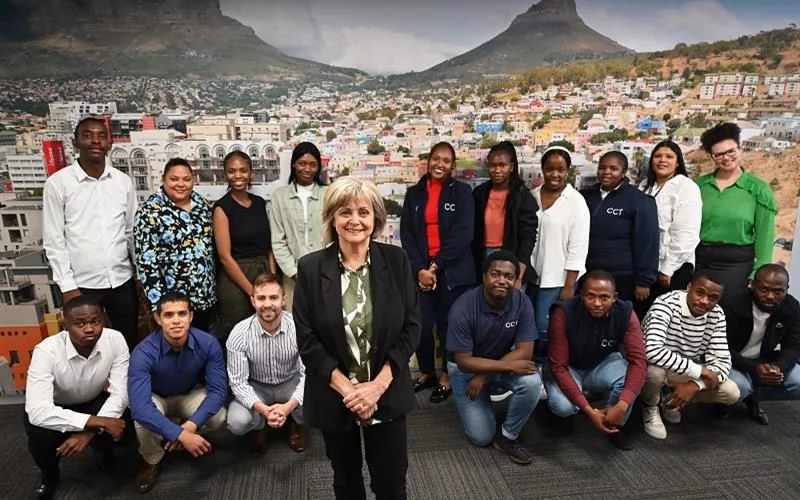Cape Town is buzzing with energy as it works hard to develop skills and create new job opportunities. By December 2024, the city aims to launch 211 apprenticeships and 1,470 learnerships, helping people grow and learn in important fields like engineering and GIS. With stunning Table Mountain as a backdrop, Cape Town is not just a beautiful place; it’s a place where young people can thrive and contribute to their communities. The city’s focus on continuous learning and mentorship ensures it remains ready for the future, making it a true hub of innovation and growth for everyone.
What initiatives is Cape Town implementing for skills development?
Cape Town is actively addressing skills scarcity through targeted programs, such as creating 211 apprenticeships and 1,470 learnerships by December 2024. The city focuses on continuous learning, mentorship, and fostering a skilled workforce in fields like engineering and GIS, ensuring adaptability and innovation.
Embracing Change in Cape Town
Cape Town, with its stunning backdrop of Table Mountain and the vast ocean, is more than just a picturesque city. It has emerged as a leader in tackling the challenge of skills scarcity, showcasing a relentless drive towards innovation and progress. The city’s Corporate Services and Human Resources Directorate has taken proactive steps to address this issue, implementing a variety of training interventions tailored to different segments of its workforce. From service and sales personnel to those operating plants and machinery, each group is provided with opportunities to enhance their skills and drive their contributions forward.
By December 2024, Cape Town proudly showcased its success in creating 211 apprenticeship opportunities and 1,470 external learnerships. These figures go beyond statistics—they signify a dedicated effort to cultivate a dynamic workforce ready to meet the complexities of modern urban management. With a workforce of over 9,500 employees, Cape Town has emphasized skill enhancement, underscoring its strategic focus on growth and development. Alderman Theresa Uys, the Mayoral Committee Member for Corporate Services, articulates this vision passionately, highlighting a mission to empower young people and enthusiastic learners among city staff and residents, ultimately boosting their ability to deliver essential services.
Since the 2014/15 financial year, Cape Town has actively engaged in the Infrastructure Skills Development Grant (ISDG) Programme, a project supported by the National Treasury. This initiative spans three years and targets skill deficits within South African municipalities by mentoring graduates toward professional registration with crucial statutory councils. ISDG graduates play vital roles in essential areas such as Civil, Chemical, and Mechanical Engineering, Biotechnology, and Geographic Information Systems, each domain underpinning the city’s infrastructural and developmental goals.
Triumphs and Transformations
One of the shining examples of the ISDG program’s success is the recent permanent placement of a Chemical Engineering graduate within the city’s operations. This story of transformation and opportunity captures the essence of the ISDG initiative. Through focused training and mentorship, young professionals carve a niche in their respective fields, working towards registration with esteemed bodies like the Engineering Council of South Africa (ECSA) and the South African Council for Town and Regional Planners (SACPLAN).
Cape Town’s initiatives reflect a broader historical narrative where skill development plays a pivotal role in societal advancement. Historically, cities faced immense pressures from rapid industrialization and urban growth, necessitating a workforce equipped to tackle evolving demands. Cities like Manchester and New York in the late 19th and early 20th centuries exemplified the transformative power of industrialization, propelled by a skilled and adaptable workforce. Cape Town’s modern approach echoes these historical paradigms, underscoring that a skilled populace remains indispensable for sustained urban development.
Furthermore, Cape Town’s focus on diverse fields such as Geographic Information Systems (GIS) and Environmental Sciences aligns with global trends that stress sustainability and technological integration. Including GIS in training underscores the growing significance of spatial data in urban planning and management. This focus ensures that Cape Town remains agile and receptive to technological advancements shaping modern urban landscapes.
Cultivating a Culture of Learning
Beyond addressing skill shortages, Cape Town’s initiatives nurture a culture of continuous learning and adaptability. This cultural evolution is crucial in an era where technological progress and shifting challenges redefine job markets. By investing in human capital, Cape Town positions itself as a city marked by resilience, innovation, and forward-thinking prowess.
Testimonials from participants further illuminate the program’s impact. Graduates often express newfound confidence and enthusiasm for contributing to significant projects. One participant shared the thrill of applying theoretical knowledge in real-world scenarios, transforming abstract concepts into tangible outcomes. This experiential learning becomes a cornerstone of their professional development, offering a solid foundation for future pursuits.
In addition, Cape Town’s strategy embodies aspects of Renaissance humanist philosophy, which championed education and skills as pathways to individual and collective empowerment. In this context, the city’s initiatives fulfill not only economic objectives but also cultural ones, nurturing a renaissance of skills that revitalizes the city’s social fabric.
A Future Forged in Skill
In conclusion, Cape Town stands as a testament to the power of strategic skills development in defining a city’s path forward. Through targeted programs and a steadfast commitment to education, Cape Town addresses the pressing issue of skills scarcity while fostering an environment conducive to innovation. This narrative echoes a broader, timeless truth: a city’s greatest asset lies in the potential of its people, empowered and educated to shape the future. Cape Town’s story is not just one of tackling current challenges but of laying the groundwork for a prosperous and adaptive future.
“`markdown
FAQ
What is Cape Town doing to combat skills scarcity?
Cape Town is actively addressing skills scarcity by implementing targeted programs, including the creation of 211 apprenticeships and 1,470 learnerships by December 2024. The city focuses on continuous learning and mentorship to develop a skilled workforce in fields such as engineering and Geographic Information Systems (GIS).
How does Cape Town support its workforce development?
The city’s Corporate Services and Human Resources Directorate has taken proactive steps to provide tailored training interventions for various workforce segments, including service and sales personnel, and those operating plants and machinery. This approach enhances skills and drives contributions across the board.
What is the Infrastructure Skills Development Grant (ISDG) Programme?
The ISDG Programme is an initiative supported by the National Treasury aimed at addressing skill deficits within South African municipalities. It mentors graduates towards professional registration with key statutory councils, focusing on essential areas such as Civil, Chemical, and Mechanical Engineering, Biotechnology, and GIS.
Can you provide examples of success from Cape Town’s skills development programs?
A notable success story from the ISDG program includes the permanent placement of a Chemical Engineering graduate within the city’s operations. This highlights the program’s effectiveness in transforming young professionals into valuable contributors to their fields.
How does Cape Town align its training programs with global trends?
Cape Town’s focus on diverse fields like GIS and Environmental Sciences aligns with global trends emphasizing sustainability and technology integration. By incorporating GIS training, the city prepares its workforce to leverage spatial data in urban planning and management.
What cultural impact do Cape Town’s initiatives have on its community?
Cape Town’s initiatives foster a culture of continuous learning and adaptability, crucial in a rapidly changing job market. By investing in human capital, the city not only addresses economic objectives but also strengthens its social fabric, nurturing a renaissance of skills that empowers its residents.
“`









